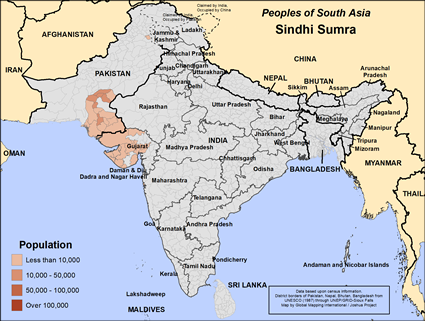Sindhi Sumra in Pakistan

Photo Source:
Copyrighted © 2026
Anonymous All rights reserved. Used with permission |

Map Source:
People Group data: Omid. Map geography: UNESCO / GMI. Map Design: Joshua Project
|
| People Name: | Sindhi Sumra |
| Country: | Pakistan |
| 10/40 Window: | Yes |
| Population: | 216,000 |
| World Population: | 248,000 |
| Primary Language: | Sindhi |
| Primary Religion: | Islam |
| Christian Adherents: | 0.00 % |
| Evangelicals: | 0.00 % |
| Scripture: | Complete Bible |
| Ministry Resources: | Yes |
| Jesus Film: | Yes |
| Audio Recordings: | Yes |
| People Cluster: | South Asia Muslim - other |
| Affinity Bloc: | South Asian Peoples |
| Progress Level: |
|
Introduction / History
The Sumra is a Muslim community of southeast Pakistan. They derived their name from Samara, a place in Iran, where their ancestor Mohamed Haneef Ali had settled. They converted from being Hindu Rajputs to Sunni Muslims during the Mogul period. In their folk lore and oral traditions they recall stories migrating from Iran.
Sindhi is the primary language of the Sumra Sindhi in Pakistan. Indian Sumra speak Gujarati. Many resources are available in Sindhi including a complete Bible and the JESUS Film.
What Are Their Lives Like?
In previous generations the Sumra Sindhi were known as fierce warriors. They fought for and against the British colonial government. However, at present most Sumra work in business, agriculture, government and trade. The Sumra often employ lower castes to farm their land. Some Sumra Sindh are members of the Pakistani military.
Marriages between first cousins are prominent. Traditionally, families arranged marriages. A man may have up to four wives if he can afford them. The marriage rituals start with betrothal ceremony. The groom and bride live with the groom's family until they can buy their own home. Sumra tend to have large families as children, especially boys, are seen as Allah's blessing. Sons inherit property and take care of elderly parents. Sumra young people are moving to cities from rural villages looking for better economic and educational opportunities.
What Are Their Beliefs?
The Sumra are Sunni Muslims. Sunni Muslims believe that the supreme God, Allah, spoke through his prophet, Mohammed, and taught mankind how to live a righteous life through the Koran and the Hadith. To live a righteous life, you must utter the Shahada (a statement of faith), pray five times a day facing Mecca, fast from sunup to sundown during the month of Ramadan, give alms to the poor, and make a pilgrimage to Mecca if you have the means. Muslims are prohibited from drinking alcohol, eating pork, gambling, stealing, slandering, and making idols. They gather for corporate prayer on Friday afternoons at a mosque, their place of worship.
The two main holidays for Sunni Muslims are Eid al Fitr, the breaking of the monthly fast and Eid al Adha, the celebration of Abraham's willingness to sacrifice his son to Allah.
Sunni religious practices are staid and simple. They believe that Allah has pre-determined our fates; they minimize free will.
In most of the Muslim world, people depend on the spirit world for their daily needs since they regard Allah as too distant. Allah may determine their eternal salvation, but the spirits determine how well we live in our daily lives. For that reason, they must appease the spirits. They often use charms and amulets to help them with spiritual forces.
There are few if any believers among the Pakistani Sumra.
What Are Their Needs?
The Sumra of Pakistan need to hear a clear presentation of the good news. They depend on works righteousness and forfeit the abundant life offered by the only savior.
Prayer Points
Pray for the Sumra to understand and respond to Christ.
Pray God will have mercy on the Sumra Sindhi, doing whatever it takes to place them in a position to receive him.
Ask God to send anointed, loving workers to the Sumra Sindhi.
Pray for an unstoppable movement to Christ among the Pakistani Sumra Sindhi.